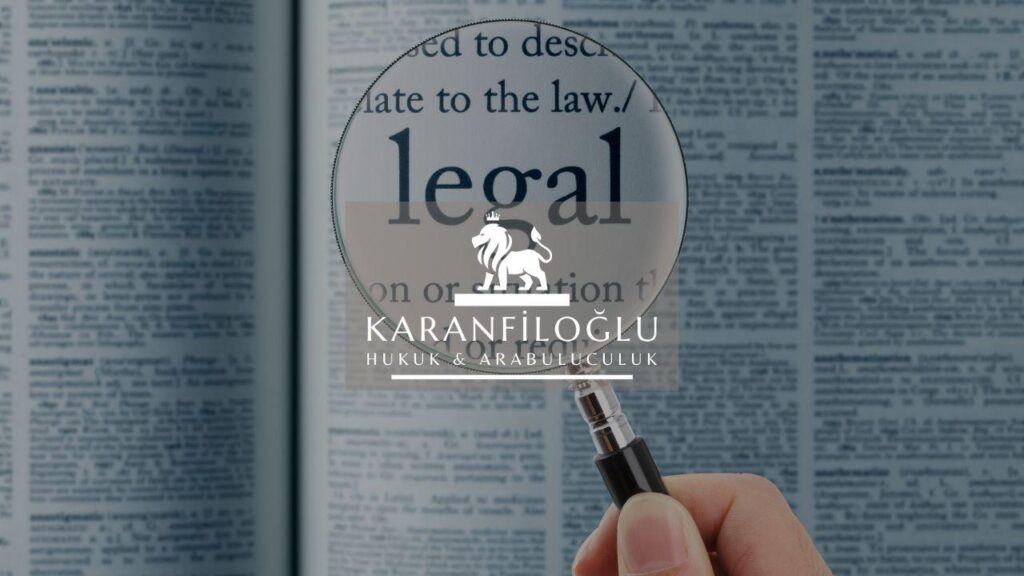Inheritance planning is a crucial aspect for individuals aiming to secure their family’s financial future and ensure a seamless transition of assets in Turkey. At Karanfiloglu Law Office, we understand the complexities involved in strategizing for succession under Turkish Inheritance Law. Governed by the Turkish Civil Code, particularly articles 495 to 501, inheritance planning necessitates careful consideration of statutory reserves, testamentary dispositions, and legal succession. Our experienced attorneys guide clients through the intricacies of preparing wills, setting up trusts, and understanding the implications of article 599 on legal heirs and reserved portions. By employing sound legal strategies tailored to individual needs, we assist clients in minimizing potential disputes and ensuring tax efficiency in accordance with the Inheritance and Transfer Tax Law. Trust Karanfiloglu Law Office to provide you with expert legal advice and comprehensive planning solutions for safeguarding your family’s wealth and legacy.
Understanding Turkish Inheritance Laws
Understanding Turkish inheritance laws is essential for efficient estate planning and smooth wealth transition. Turkish Civil Code provisions, specifically Articles 495 to 501, define the legal framework governing the devolution of an estate and the rights of heirs. Under these regulations, inheritance is typically categorized into statutory and testamentary succession. Statutory succession prevails in the absence of a valid will, where the estate is distributed among legal heirs with preferences as per intestate succession rules, often placing immediate family members, such as spouses and children, in priority positions. Testamentary disposition provides individuals the autonomy to determine the distribution of their estate, subject to constraints like reserved portions for legitimate heirs, capturing the essence of Article 499, which ensures that certain heirs cannot be entirely disinherited. Understanding these nuances enables individuals to make informed decisions, thereby safeguarding family interests and preventing legal disputes in inheritance matters.
Navigating Turkish inheritance laws also involves understanding the complex yet critical concept of statutory reserves and legal portions, detailed under Article 506 of the Turkish Civil Code. These statutory reserves are specific shares of an estate that are legally protected and allocated to certain heirs, ensuring financial provision for spouses, descendants, and ascendants. For instance, children and spouses are entitled to reserved portions, preventing their complete disinheritance by a testator. The reserved portion for descendants typically amounts to half of what they would receive in statutory succession, whereas the spouse’s reserved portion depends on the existence of other heirs and marital property regime. It’s crucial to recognize how these protected shares impact the ability to freely allocate assets through a will, offering predictability and security for primary heirs while still allowing some flexibility. Strategic planning, therefore, must account for these statutory reserves to align testamentary wishes with legal obligations, avoiding potential legal challenges to wills and testamentary allocations.
Furthermore, in the context of Turkish inheritance laws, individuals must also consider the implications of the Inheritance and Transfer Tax Law, which affects the financial aspects of asset distribution. The law mandates that taxes are levied on inherited assets, and the rate depends on the relationship between the deceased and the heir, as well as the value of the inheritance. At Karanfiloglu Law Office, we emphasize the importance of strategic tax planning within inheritance arrangements to alleviate the potential financial burden on heirs. Leveraging exemptions and reductions provided under specific circumstances, such as those for immediate family members, can significantly reduce tax liabilities. By understanding the dual implications of legal and tax considerations, individuals can thoroughly prepare to pass on their estate with minimal economic impact. Our team works closely with clients to devise customized strategies that integrate both legal and tax efficiency, ensuring a seamless transition of wealth.
Strategies for Minimizing Inheritance Tax in Turkey
In Turkey, minimizing inheritance tax is a critical objective for preserving family wealth and ensuring a smooth transfer to successors. Under the Inheritance and Transfer Tax Law, strategic planning becomes essential to lessen the tax burden on heirs. One effective approach involves utilizing the legal exemptions and reductions outlined in the law, such as the personal exemption amounts, which vary depending on the familial relationship to the deceased. Moreover, establishing lifetime gifts and donations can be an advantageous method to redistribute assets gradually, thereby potentially reducing the taxable estate’s value. Another option is to strategically structure the estate through proper testamentary dispositions, per articles 495 to 501 of the Turkish Civil Code, ensuring that assets are allocated in ways that optimize tax efficiency. Engaging qualified legal expertise from Karanfiloglu Law Office is imperative to navigate these strategies effectively, ensuring compliance with Turkish tax legislation while safeguarding your estate’s financial impact on your heirs.
Additionally, understanding and leveraging tax treaties can play a significant role in minimizing inheritance tax within Turkey. For individuals with assets or beneficiaries in multiple countries, these treaties might provide avenues for reducing double taxation, meaning tax obligations in more than one jurisdiction. It’s crucial to analyze any applicable bilateral agreements that Turkey has entered into, which might influence tax liabilities on cross-border inheritances. Furthermore, seeking opportunities to utilize deductions and allowances as outlined in the Inheritance and Transfer Tax Law can provide further relief. For instance, funeral expenses and debts owed by the deceased can often be deducted from the estate’s value, potentially lowering the overall tax base. At Karanfiloglu Law Office, we offer expert guidance in assessing these factors, translating to more strategic tax planning and optimization for clients facing the complexities of cross-border inheritance issues and localization under Turkish law.
A crucial aspect of minimizing inheritance tax in Turkey is the strategic use of family partnerships and companies, which can provide significant tax advantages under the current legal framework. By transferring assets into these entities during the lifetime of the testator, one can effectively control the distribution and management of wealth, reducing the tax impact at the time of succession. This strategy aligns well with articles 504 to 511 of the Turkish Civil Code, which allow for flexible arrangements regarding the continuity of family businesses and assets beyond individual ownership. Additionally, incorporating life insurance into an estate plan can also serve as a tax-efficient tool, as proceeds are typically excluded from the taxable estate and provide liquidity to cover any potential tax liabilities. Karanfiloglu Law Office is committed to providing personalized solutions that incorporate these sophisticated strategies, ensuring minimal tax consequences and preserving your family’s financial legacy for future generations while remaining fully compliant with Turkish inheritance and tax laws.
Protecting Family Wealth Through Effective Estate Planning
Effective estate planning is essential for protecting family wealth, ensuring that assets are distributed according to one’s wishes, and avoiding potential legal conflicts among heirs. In Turkey, strategic planning must take into account the regulations outlined in the Turkish Civil Code, such as the mandatory reserved portion for legal heirs governed by articles 506 to 511. This involves evaluating family dynamics and financial commitments, while also considering the implications of the Turkish Inheritance and Transfer Tax Law, designed to prevent undue tax burdens on heirs. Crafting a well-documented last will, establishing charitable donations, or forming family trusts are among the tools that can be tailored to individual circumstances, allowing greater control over asset allocation. At Karanfiloglu Law Office, our seasoned attorneys specialize in crafting comprehensive estate plans that address these complex legal requirements, ensuring a smooth transition of assets and preservation of family wealth for future generations.
One key aspect of estate planning in Turkey is understanding the breadth of legal tools available to ensure the protection and effective distribution of family assets, such as usufruct rights and inter vivos gifts, as detailed in the Turkish Civil Code articles 517 to 519. Usufruct rights, or ‘intifa hakkı’, allow individuals to grant beneficiaries the right to use and benefit from property without transferring direct ownership, offering a flexible approach to asset management during one’s lifetime. Inter vivos gifts, on the other hand, help reduce potential tax liabilities on estates by transferring assets before one’s passing, thus optimizing tax positions as per the Inheritance and Transfer Tax Law. Furthermore, it is crucial to consider the family’s unique needs and future objectives when designing these arrangements. At Karanfiloglu Law Office, we provide personalized legal advice that aligns with the current legal framework and ensures your estate planning strategy meets both your present and future family objectives, safeguarding your legacy.
In addition to using traditional estate planning tools, leveraging prenuptial and postnuptial agreements can safeguard family wealth against potential disputes or erosions due to marital property claims, which are outlined in the Turkish Civil Code, articles 202 to 281. By delineating the personal and shared assets of spouses, these agreements provide clarity and prevent future disagreements over inheritance rights. Furthermore, periodic review of estate plans is vital in accommodating changes in Turkish legislation or shifts in family circumstances that might affect the established strategies. At Karanfiloglu Law Office, we emphasize the importance of regularly updating these plans to reflect current laws and personal situations. By staying proactive and informed, our clients can ensure their estate plans remain robust and effective, protecting their family’s financial standing across generations. Trust our team to offer strategic insights and solutions tailored to preserve and enhance your family’s wealth within the legal framework.
Disclaimer: This article is for general informational purposes only and you are strongly advised to consult a legal professional to evaluate your personal situation. No liability is accepted that may arise from the use of the information in this article.







